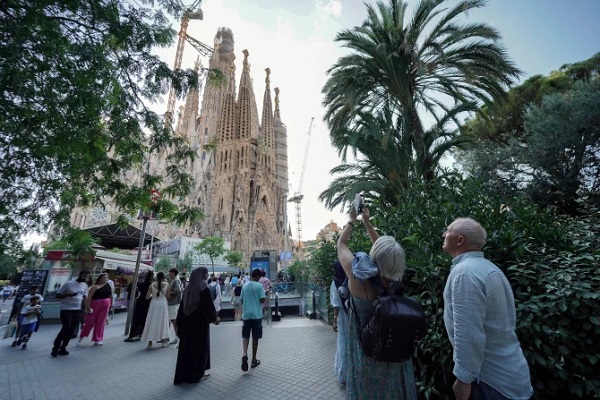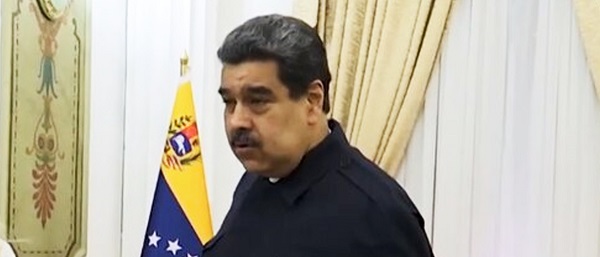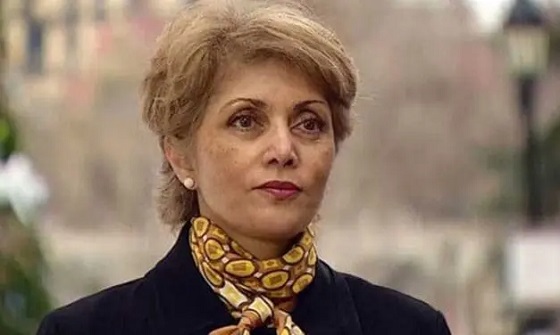International
Goodbye to Joe Biden, and Whoever Was President the Last Four Years

From Racket News
By Matt Taibbi
The “Invisible Presidency” is an all-time criminal, and must not be allowed to flee
I saw His Majesty myself about half past twelve o’clock. His conversation was so hurried, and, though not unconnected or irrational, so unlike his ordinary manner that I certainly should not have thought it proper to have taken his signature or his pleasure to any Act.
— Spencer Perceval, Chancellor of the Exchequer, in an 1810 letter about King George III
King George III went mad as a March hare, talking until he foamed at the mouth, writing 400-word sentences, threatening to “befoul himself,” holding conversations with imaginary people, and insisting he had power to reanimate the dead. Contemporary notes often describe him “in restraint” and “lost in reverie.” His last, worst phase began in 1810, his 50th in power, a jubilee year requiring constant public appearances. The Last King of America by Andrew Roberts shows it can be done:
No fewer than 650 public events — parades, receptions, luncheons, bonfires, firework displays, illuminations and the like — took place in England alone; there were many more across the rest of the United Kingdom and in the empire beyond.
Joe Biden said goodbye to America Wednesday night. The most controversial part of an otherwise weirdly half-assed address (maybe his writers have stopped caring?) was a warning. “Today, an oligarchy is taking shape in America of extreme wealth, power and influence,” he said, a “tech industrial complex” that “literally threatens our entire democracy.”
Biden always loved the word “literally.” He’s been misusing it for decades, from “we literally can’t survive” four more years of Bush policy, to the 2008 election winner having an opportunity “literally to change the direction of the world,” to Barack Obama’s story being “literally incredible,” to saying he’s “literally rebuilding our entire nation,” and on and on. With Bidenterms like look, here’s the deal, let me tell you, I promise you, and C’mon, Biden says “literally” often enough to make “Word Crimes” singer Weird Al Yankovic want to “literally smack a crowbar upside your stupid head.” Here, it’s at least a sign that Biden might have added to the speech on his own.
Most all Biden speeches are acknowledged (Lincoln, Obama) or unacknowledged (Neil Kinnock, John Kennedy) homages to other politicians. This last one Biden attempt at an Eisenhower impersonation is backward. We’re warned about an “oligarchy,” which Webster’s defines as “a government in which a small group exercises control especially for corrupt and selfish purposes.” He tries to tag disobedient billionaires like Elon Musk, Marc Andreessen and Mark Zuckerberg (as opposed to Reid Hoffman, Bill and Melinda Gates, Steven Schwartzman, etc.) as this new oligarchy, but there’s one even closer to home, which Biden later in the speech referenced:
In the years ahead… it is going to be up to the president, the presidency, the congress, the courts, the free press and the American people… I still believe in the idea for which this nation stands… Now it’s your turn to stand guard.
Biden’s possibly ad-libbed distinction between “president” and “presidency” was the most inspired line of his political career. America just went through four years in which the public was conned into viewing two stories as one. The first was about Joe Biden the human being, a disintegrating flesh-and-blood patsy, conscripted to such a miserably slapstick public regimen that it was impossible not to feel sorry for him. The second was about the presidency, which for years now has been like the eponymous Claude Rains villain in The Invisible Man: an unseen monster.
For four years, while Buster Keatonesque videos of stumbling, tumbling Biden filled social media, just a handful of clues leaked about the ethereal “Presidency” running the American superpower. The latter existed separate from Biden and is scheduled to slither aside Monday. It exits on a bitter note, blaming an “avalanche of misinformation and disinformation” (not enough censorship) for its inability to be re-elected while strapped to a corpse. It hopes to get away unseen and probably will, as reporters prepare to chase the great baited hook that is Donald Trump. It’s too bad James Whale is dead, since this monster’s story will make a great horror movie someday.
Here are two sincere notes of farewell, to the hapless shrinking man Joe Biden, and to his more powerful partner, the “Presidency” :
Censorship Industrial Complex
Senate Grills Meta and Google Over Biden Administration’s Role in COVID-Era Content Censorship

Lawmakers pressed Meta and Google to explain how far White House outreach went in shaping their censorship decisions.
|
A Senate hearing this week discussed government influence on online speech, as senior executives from Meta and Google faced questions about the Biden administration’s communications with their companies during the COVID-19 pandemic.
The session, titled “Part II of Shut Your App: How Uncle Sam Jawboned Big Tech Into Silencing Americans,” highlighted the growing concern in Washington over what lawmakers describe as government-driven pressure to suppress lawful expression.
Senator Ted Cruz (R-TX), who led the hearing, began by declaring that “the right to speak out is the foundation of a free society” and warning that “censorship around the world is growing.”
He accused the Biden administration of pushing technology companies to restrict Americans’ speech during the pandemic, and he faulted both the companies and Democrats for failing to resist that pressure.
“Today, we pick off where the story left off,” Cruz said, pointing to Meta and Google as examples of firms that “were pressured by the Biden administration to censor the American people.”
He pledged to introduce the Jawbone Act, which he said would “provide a robust right to redress when Americans are targeted by their own government.”
Markham Erickson, Google’s Vice President of Government Affairs and Public Policy, defended the company’s approach, emphasizing that its moderation decisions are guided by long-standing internal policies, not by government direction.
“While we are a company dedicated to the goal of making the world’s information universally accessible, that doesn’t mean that we don’t have certain rules,” Erickson said, citing restrictions on “terrorist content, child sexual abuse material, hate speech, and other harmful content.”
He acknowledged that officials in the Biden administration had contacted Google during the pandemic to urge the removal of certain COVID-19 content from YouTube.
But Erickson maintained that the company “develop[ed] and enforce[d] our policies independently” and “rejected suggestions that did not align with those policies.”
Erickson also alleged that Google has a record of resisting censorship demands from foreign governments, citing its refusal to remove politically sensitive videos in Russia despite threats of imprisonment against employees and fines “that exceed more than the world’s GDP.”
Neil Potts, Meta’s Vice President of Public Policy, took a more reflective stance.
He reiterated that Meta has a “foundational commitment to free expression” and acknowledged that the company had yielded to “repeated pressure” from the Biden White House to restrict COVID-related posts, including satire and humor.
“We believe that government pressure was wrong and wish we had been more outspoken about it,” Potts said. He added that Meta “should not compromise our content standards due to pressure from any administration in either direction.”
Potts pointed to policy changes the company has made since then, such as ending its third-party fact-checking program, reducing restrictions on political topics, and adopting what he described as “a more personalized approach to political content.”
These steps, he said, were intended to “return to our ideals about free expression” and “allow for more speech.”
Senator Cruz pressed both executives on whether their companies regretted complying with government demands.
Potts responded that Meta “do[es] regret our actions for not speaking out more forcefully.”
Erickson, however, declined to use similar language, saying Google regularly receives “outreach from a lot of actors” and evaluates flagged material independently.
The exchange grew more pointed as Cruz questioned Google’s removal of a YouTube video that compiled election-fraud claims made by both major parties. Erickson conceded, “Yes, that is news,” when Cruz asked whether statements by presidential candidates about election integrity should be considered newsworthy.
But Erickson defended YouTube’s policies during the 2020 election, saying that after states had certified results, the company acted against “claims of widespread fraud” due to potential “real-world harm.”
Cruz accused Google of ideological bias and suggested the company was “unwilling to express regret for anything at all.”
He contrasted that with Meta’s statement of remorse and concluded that Google’s position reflected “a level of contempt for free speech that does not reflect well.”
Where Erickson had insisted that Google “continued to develop and enforce our policies independently,” the company’s letter to Congress acknowledged that “Senior Biden Administration officials, including White House officials, conducted repeated and sustained outreach” urging the removal of COVID-19 content that did not violate platform rules.
This was somewhat of a departure from the defensive posture Google maintained before the Senate.
|
|
|
|
You read Reclaim The Net because you believe in something deeper than headlines; you believe in the enduring values of free speech, individual liberty, and the right to privacy.
Every issue we publish is part of a larger fight: preserving the principles that built this country and protecting them from erosion in the digital age.
With your help, we can do more than simply hold the line: we can push back. We can shine a light on censorship, expose growing surveillance overreach, and give a voice to those being silenced.
If you’ve found any value in our work, please consider becoming a supporter.
Your support helps us expand our reach, educate more people, and continue this work.
Please become a supporter today.
Thank you for your support.
|
International
Sagrada Familia Basilica in Barcelona is now tallest church in the world

The Sagrada Familia (Holy Family) minor basilica in Barcelona is now the tallest church in the world, standing at 535 ft., surpassing Ulm Germany’s main church, whose construction began in the 14th century.
According to the Sagrada Familia Expiatory Church Construction Board Foundation, as reported Oct. 30 by the Archdiocese of Barcelona, ”the first element that forms part of the cross on the tower of Jesus Christ” was installed, marking the beginning of the final phase of construction of the church’s central tower.
Working at a height of more than 150 metres, the crane operators also make it possible for the Sagrada Família to keep growing and rising up towards the Barcelona sky. 🏗 This video takes a behind-the-scenes look at a day in the life of the Basilica’s crane operators. Don’t miss… pic.twitter.com/8ead28LCEG
— La Sagrada Família (@sagradafamilia) October 31, 2025
This latest addition consists of the lower portion of the cross, measuring over 20 ft. high and weighing 24 tons. “With a double-twist geometry, the lower portion has a square shape at the base that transforms into an octagonal shape at the top,” whose exterior is “clad with white glazed ceramic and glass, materials that stand out for their reflective properties and resistance to atmospheric conditions,” the news brief explains.
The tower of Jesus Christ is the tallest of the central towers of the church designed by Antoni Gaudí, who died a century ago. The completion of this structure “will be a historic milestone for Sagrada Familia and a tribute to its architect.”
More than 140 years of history
The first stone of Sagrada Familia Basilica was laid on March 19, 1882, according to the design of the architect Francisco de Paula del Villar. The following year, Antoni Gaudí took over the project, modifying it according to his architectural genius and renowned Modernist style. From 1914, Gaudí dedicated himself exclusively to this church until his death on June 10, 1926.
On April 14, 2025, Pope Francis declared the architect venerable, in accordance with the criteria set by the Dicastery for the Causes of Saints.
This story was first published by ACI Prensa, CNA’s Spanish-language news partner. It has been translated and adapted by CNA.
-

 Business2 days ago
Business2 days agoBank of Canada governor warns citizens to anticipate lower standard of living
-

 Agriculture1 day ago
Agriculture1 day agoCloned foods are coming to a grocer near you
-

 International1 day ago
International1 day agoUS Reportedly Weighing Military Strikes On Narco Targets Inside Venezuela
-

 International1 day ago
International1 day agoSagrada Familia Basilica in Barcelona is now tallest church in the world
-

 Alberta1 day ago
Alberta1 day agoGondek’s exit as mayor marks a turning point for Calgary
-

 Fraser Institute1 day ago
Fraser Institute1 day agoOttawa continues to infringe in areas of provincial jurisdiction
-

 Business4 hours ago
Business4 hours agoYou Won’t Believe What Canada’s Embassy in Brazil Has Been Up To
-

 Automotive4 hours ago
Automotive4 hours agoCarney’s Budget Risks Another Costly EV Bet














